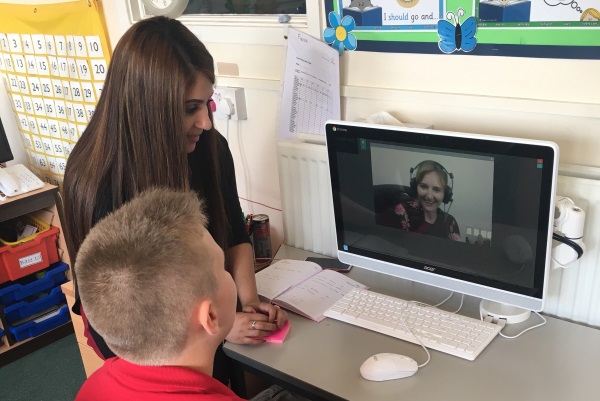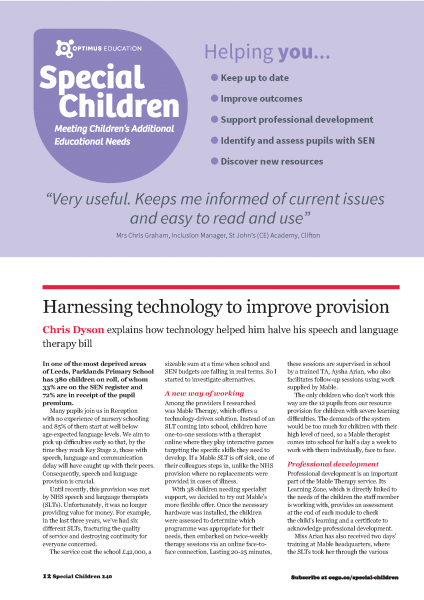Speech and language skills are essential if pupils in Reception are to be expected to access the curriculum. I found out how one TA has helped improve her school's provision for SLCN.

On Tuesday it was revealed that the government will not continue funding for The Communication Trust, a charity that provides specialist guidance, training and resources to teachers working with SLCN, after March. This is alarming, and flies in the face of vital work being undertaken by professionals across the country to get pupils off to the best possible start.
In schools where a significant number of pupils enter Reception with speech or language delay, SENCOs need to be able to see the impact of every penny the school spends on externally provided speech and language therapy (SLT).
Early screening and targeted intervention are especially important for supporting disadvantaged children, whose early language difficulties can not only persist but become more pronounced as the child progresses through primary school.
The government's decision comes at a strange time. Last September, the Early Intervention Foundation (EIF) published research highlighting that speech, language and communication issues can be as significant an indicator of wellbeing as obesity and mental health.
But in an austere climate, schools are having to find effective and affordable means of providing for SLCN (be it in-house or through external providers), and keeping early language development at the heart of teaching and learning.
Incredible outpouring of concern about discontinuation of the specialist SLCN contract. Thank you so much. The impact on children and young people needs to be made clear.
— Communication Trust (@Comm_nTrust) January 28, 2018
The petition to reinstate funding for TCT is in reach of its target of 5000 signatures, and many teachers have stressed just how vital the trust's work has been to improving outcomes.
If it cannot be saved, the collapse of the trust will offer a stark reminder that while the DfE will always be the first to pledge its support for SLCN, the onus falls on schools themselves to make something of this commitment.
Last year, staff at Parklands Primary School in Leeds made the decision to overhaul their provision for SLCN. The NHS-led therapy they had hitherto been using ‘was no longer offering value for money’, admits the school’s headteacher, Chris Dyson. They had seen six speech and language therapists (SLT) come and go over the course of three years.
In the summer term, the school decided to introduce Mable Therapy, a local provider of speech and language therapy. Mable's system is predominantly virtual, with pupils taking part in games and activities during one-to-one, online sessions with a Mable therapist. The therapists work closely with the pupils, their parents and school staff to monitor the impact of these interactive sessions and any follow-up work.
To find out what this specialist support for SLCN looks like in practice, I caught up with Aysha Arian, a teaching assistant at Parklands. We had previously interviewed Aysha for her work in running LEGO therapy sessions for SLCN, and she has since taken on the responsibility of supervising the Mable sessions and completing any follow-up work.

Miss Arian observes as a pupil interacts with the speech and language therapist
‘At Parklands, we provide for pupils with a wide range of SLCN, including speech sound delay and language delay. When a pupil is first referred to the Mable therapists, they will be invited to an initial assessment session, lasting from 45-60 minutes. This is when the therapist carries out a range of expressive and receptive subtests, as well as an observation of social communication skills.
'The Mable software then analyses the percentage score in each subtest and identifies the areas of need. The therapist also gathers a case history from the pupil’s parents and the class teacher, contributing to a holistic profile of the pupil’s needs.
‘Before I began working with Mable, I was invited to spend two days in the therapists’ office, where they showed me how to use the system, and how they create the targets and games. Sessions are arranged to suit the pupil, not the therapist, meaning the therapy can take place across multiple days.
'The pupils are assigned therapists according to who is best qualified to support each area of SLCN. Each session will last approximately 20 minutes, which is the perfect length of time for keeping the pupil engaged from start to finish. Afterwards, the therapist takes 10 minutes to write up the session notes while I head off to retrieve the next pupil.
Sessions are arranged to suit the pupil, not the therapist
‘Follow-up work is a crucial part of the therapy: it doesn't start and finish with the one-to-one sessions. After each session, the therapist emails me some work to help extend our support for that pupil. I can easily adapt the resources to meet other children should I need to.
'The Mable team have recently released a weekly plan for all the pupils on their caseload. They are very conscious of the school’s time constraints, so each week they provide one short task and brief advice on how to improve in that area.
‘After the initial phone call with a Mable therapist, parents are invited to register as a Mable user using their email address, meaning they can access their child's reports at any time of day. Mable has an ‘Ask a question’ button on their reports, which parents can use to seek clarification on any specific topic. The system will also notify parents via text message when the therapist has published a new report – no more waiting for the post! Parents are more than welcome to sit in on sessions too if they wish.
Parents are more than welcome to sit in on sessions too if they wish
‘Working with the therapists has made it easier for me to talk to teachers and parents about the support we can provide for pupils with more complex SLCN. I’ve worked with teachers to adapt the therapists’ techniques to in-class learning, we can see that the progress pupils make during the sessions is having a broader effect on their performance at school.
'Most importantly, the children who have taken part in the sessions enjoy every minute. They always tell me they’ve liked the games and activities. Receiving speech and language therapy in this way is something that they look forward to time after time.’
 For more from Chris on how Parklands cut the price of its provision for SLCN, download a free excerpt from the latest issue of Special Children magazine.
For more from Chris on how Parklands cut the price of its provision for SLCN, download a free excerpt from the latest issue of Special Children magazine.
Published six times a year, Special Children magazine brings you in-depth reports, expert guidance and the latest innovation to help you support the progression of every child in your school or setting.